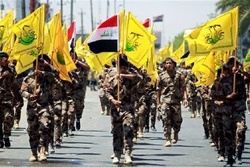 The United States has sanctioned Iraq’s Harakat Hezbollah al-Nujaba, a Shia movement known for its active cooperation with the national army in counter-terrorism operations, which led to the collapse of the Takfiri terror group of Daesh in late 2017.
The United States has sanctioned Iraq’s Harakat Hezbollah al-Nujaba, a Shia movement known for its active cooperation with the national army in counter-terrorism operations, which led to the collapse of the Takfiri terror group of Daesh in late 2017. RNA - On Tuesday, the US Department of the Treasury added Nujaba and its leader, Akram al-Ka’abi, to the list of Specially Designated Nationals and Blocked Persons by the Office of Foreign Assets Control.
The department claimed in a press release that Nujaba and its leader “have committed, or pose a significant risk of committing, acts of terrorism,” and that their blacklisting is meant to deny them “the resources to plan and carry out terrorist attacks.”
“Among other consequences, all of their property and interests in property subject to US jurisdiction are blocked, and US persons are generally prohibited from engaging in any transactions with them,” it added.
Back in 2008, Ka’abi was sanctioned by the US Treasury for allegedly threatening Iraq’s peace and stability.
Nujaba - a group of about 10,000 fighters - has been operating under the banner of the government-backed Popular Mobilization Units (PMU), better known by the Arabic name Hashd al-Sha’abi.
Iraq declared victory over Daesh in late 2017, after the national army, backed by Hashd al-Sha’abi, regained control of all areas seized by the Takfiri terror organization. Iraqi forces are now working to rid the country of Daesh remnants.
The Baghdad government later issued “regulations to adapt the situation of the Popular Mobilization fighters,” giving them ranks and salaries equivalent to other branches of the Iraqi military.
The fresh ban comes at a time when calls have grown in Iraq for the withdrawal of American forces, now that Daesh has been defeated. Harakat al-Nujaba is also an outspoken critic of Washington’s military presence on Iraqi soil.
Iraqi Shia lawmakers have vowed to table legislation in the parliament demanding foreign troops’ pullout. Prime Minister Adil Abdul-Mahdi said he would respect the legislature’s decision.
US President Donald Trump raised the ire of Iraqis by making an unannounced visit last December to US forces deployed to al-Asad Air Base in western Anbar Province, with no stop in Baghdad.
The US, backed by the UK, invaded Iraq in 2003 claiming that the former regime of Saddam Hussein possessed weapons of mass destruction.
No such weapons, however, were ever found, and the invaders withdrew from Iraq, after nearly nine years of a military campaign that cost tens of thousands of Iraqi lives.
Leading a new coalition of its allies, the US returned to Iraq in 2014 under the pretext of fighting Daesh.
Widespread reports, however, said the Washington-led operations largely spared the terrorists and led, instead, to civilian deaths and inflicted damage on Iraqi infrastructure.
Despite the defeat of Daesh, Trump said last month that American forces must remain in Iraq so Washington can keep a close eye on Iran, prompting condemnations from Iraqi officials.